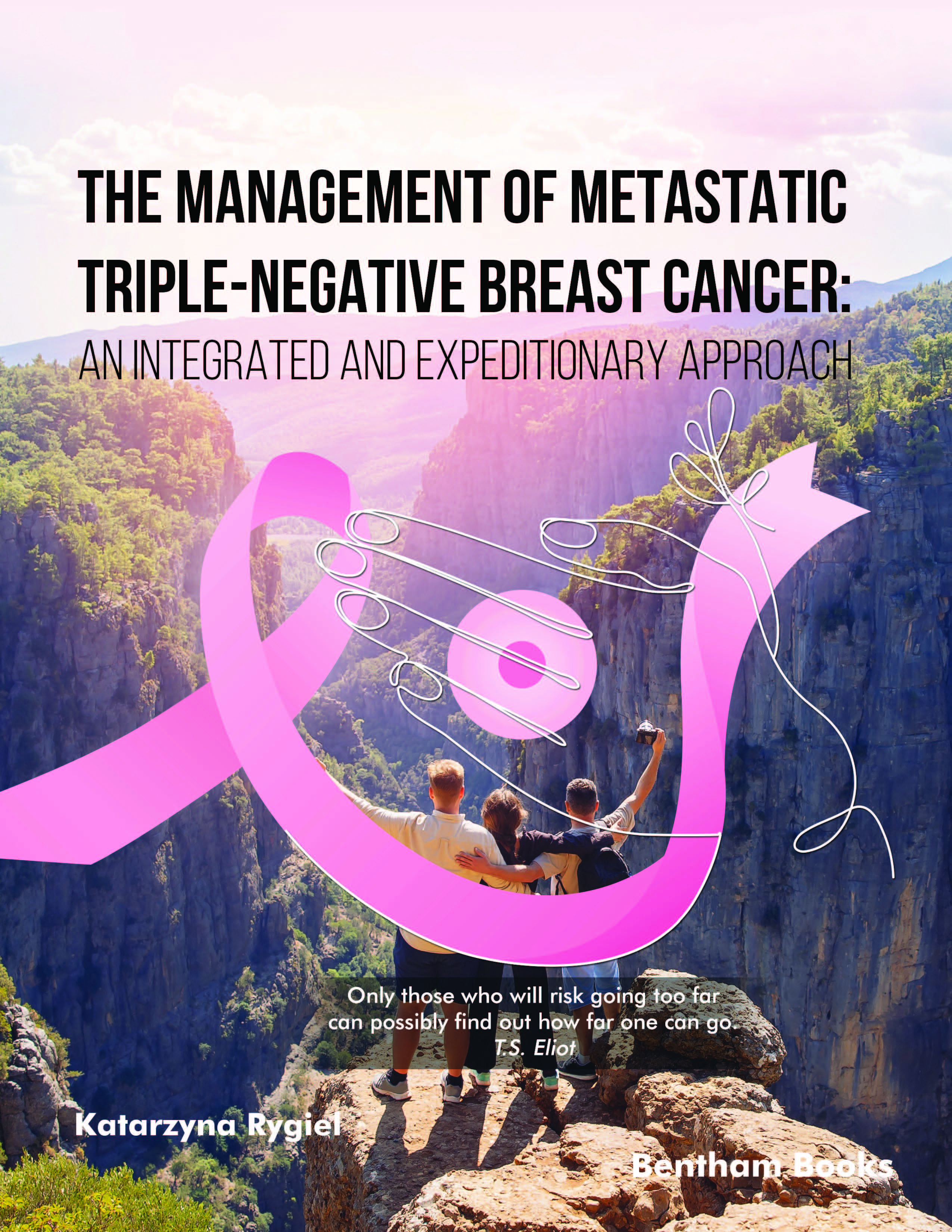Despite recent therapeutic advances in
metastatic triple-negative breast cancer (TNBC), it still remains an incurable disease. The latest progress in the TNBC research has resulted in some
innovative therapeutic options, such as
immunotherapy, antibody-drug conjugates (ADC), and
inhibitors of poly (ADP-ribose) polymerase (PARP), which can be applied in combination (or in sequence) with standard chemotherapy (CHT) regimens. Such
targeted therapies bring some hope with regard to the prognosis for many women suffering from metastatic TNBC. However many of these novel agents have some serious
adverse effects, and thus, the right patient selection, careful monitoring, and rapid delivery of medical therapies to relieve side effects are imperative.
To address these issues, a book
titled
: “The Management of Metastatic Triple-Negative Breast Cancer: An Integrated and Expeditionary Approach” integrates multidisciplinary knowledge and experience from the perspective of medical professionals and researchers in the TNBC area, and combines it with the patient’s point of view. This book is composed of two parts.
PART 1
An Overview of the Ethnic Disparities and Current or Emerging Targeted Therapies for Patients with Advanced or Metastatic Triple-Negative Breast Cancer (TNBC).
PART 2
The Role of Patient Education, Empowerment, and Communication with Medical Teams, and Psychological or Supportive Approaches in Advanced or Metastatic Breast Cancer (BC).
The first chapter of Part 1 introduces some important aspects of ethnicity, obesity associated with metabolic syndrome and chronic inflammation, as well as reproductive, social, and environmental factors, which can greatly influence TNBC outcomes. This is critically important for an understanding of the risk, development, and progression of TNBC in various ethnic groups, such as African American (AA) and European American (EA) women. Moreover, considerations of predisposing and aggravating environmental, socioeconomic, and behavioral factors, which may have a major impact on BC prevention, course, and survival are briefly presented.
Consecutive chapters of
Part 1 discuss current and emerging targeted therapies for patients with advanced or metastatic TNBC, based on recent, major clinical trial results. Recommendations for clinicians and patients are briefly summarized at the end of each chapter. The last chapter of Part 1 describes a noninvasive “tool” of Precision Medicine that may be considered for the individualized treatment of women with BC. This tool attempts to link the main clinical objectives with the personal goals of the patients suffering from advanced or metastatic TNBC or other difficult-to-treat BC subtypes.
The initial chapters of
Part 2 provide focused psychoeducational information for patients with advanced or metastatic stages of BC (e.g., TNBC subtype). This information is designed to facilitate clear communication between the patients and the treatment team members. Subsequent chapters of Part 2 contain different cognitive and behavioral concepts and examples
of
the
relevant
therapeutic strategies. They include easily available techniques for coping with stress, which accompanies women with BC, during multiple diagnostic and therapeutic stages, and often aggravates their health conditions.
Traditionally, in the majority of publications concerning BC, the medical and psychological topics are usually presented as two separate groups of problems, while in reality, such a division is rather artificial, since these issues are always interrelated. To properly address this need, the book highlights an
integrative approach to these deeply interconnected areas. Also, the added value of this book consists of
blending the latest evidence from research trials in the TNBC area with clinical practice and feasible psycho-educational approaches, which can be suitable
for individual patients and their caregivers. Combining targeted treatments for TNBC with effective coping with distress (commonly associated with uncertain or poor prognosis and overwhelming adverse effects of different targeted therapies) as well as simple lifestyle modifications represent the key elements, which can substantially ameliorate outcomes, even in the most vulnerable patients with metastatic TNBC.
Importantly, this book
bridges the gap between the strictly clinical or research-related aspects of BC management and the personal needs and expectations of patients with BC. It also invites medical professionals who are physicians, psychologists, pharmacists, and researchers in the field of BC to conduct open
dialogues with patients, aimed at their practical education and support. It also includes helpful
resources for the support of both the patients and their medical caregivers, as “partners” and “co-passengers” of their joint “expedition” to conquer BC and reclaim the necessary balance or comfort in life.
In addition, this book presents a
novel concept of a challenging journey for patients with TNBC (or other aggressive subtypes of BC, especially in advanced or metastatic stages), which can be perceived or interpreted as a series of stimulating “adventures” and meaningful educational events. This, in turn, can shed some bright light on a serious, chronic disease, like BC, and its interconnected risk factors. Such an approach may
positively influence the attitude of many women suffering from BC. Hopefully, instead of approaching a diagnosis and therapy of TN BC as a terrifying “war”, composed of devastating ”battles”, the patients may
change
their perspective on this life-threatening disease
, and view it as a real
opportunity to use the modern armamentarium of current pharmacologic therapies and noninvasive, cost-effective, feasible psychological, and supportive modalities to improve their outcomes.
Finally, the
purposely changed narration, used in many chapters, is
intended to re-direct many suboptimal cognitive and emotional stereotypes, which are often perpetuated by numerous patients with BC. To accomplish these long-term goals, it is necessary
to teach the medical team members to positively “re-orient”
women with BC,
so that they can stay
motivated, and engaged in active participation in their oncology care. It requires a lot of time, effort, initiative, expertise, and cooperation within multidisciplinary teams of medical providers. However, in the long run, this may
beneficially transform the approach to BC, its management, and prevention. Simultaneously, well-educated and empowe- red patients may be able to communicate and integrate their efforts with the professional actions of the medical teams, in charge of their care.
Katarzyna Rygiel
Department of Family Practice
Medical University of Silesia (SUM)
3 Maja St., 41-800, Zabrze
Poland

